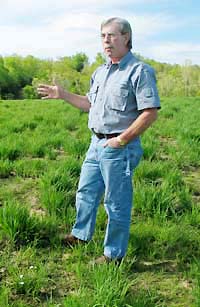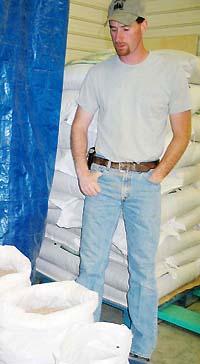Native Grasses Have Advantages; Kentucky Company Providing Seed
Native Grasses Have Advantages; Kentucky Company Providing Seed


John Seymour
Native warm season grasses are growing in popularity for use in conservation practices, wildlife habitat and forages for livestock.
The University of Kentucky College of Agriculture has been conducting research trials with native warm season grasses for about 20 years at the UK Research and Education Center in Princeton, said Monroe Rasnake, a UK agronomist. And more recently, a Kentucky business, Roundstone Native Seed, is working to ensure grasses native to the state are readily available.
“We started looking at big bluestem, little bluestem, Indian grass, switchgrass and Eastern gamma grass primarily to see how well the available cultivars would do in this part of the state,” Rasnake said. “We were able to get very good yields with those species. Our primary focus was forage. We wanted to see how much production we could get.”
UK also did some work on establishment and management of the grasses because they are very different than cool-season grasses such as fescue and orchardgrass.
“The main reason we want to have a warm-season grass is to fill in during the summer slump of cool season forages,” he said. “These do their best during that time of year and because they are perennials they are better suited in that farmers don’t have to re-establish them every year.”
Rasnake said native plants are less susceptible to problems other forages might have, such as disease and insects. They have very few problems once they are established.
Roundstone Seed grew from the desire of Randy Seymour and his son, John, to have native grasses on their farm. Kentucky once had several millions acres of these grasses, Randy Seymour said, but today only small patches exist. The elder Seymour has been involved with the Nature Conservancy for many years and worked with the conservancy to restore some of the Kentucky ecotypes.
“We have found that there is a significant different between the plants of the same species that evolved here compared to those that evolved out west,” he said. “The Nature Conservancy wanted native plants but there was no source so, initially, we were working with them to produce seed with a local source.”
That meant searching the countryside and hand-collecting seed. The native seed business started as a hobby but has grown so much that the Seymours stopped their other farming operations to focus on it. Today, they have 32 farmers growing for them. The harvesting equipment is manufactured specifically for the company, and John Seymour designed and built the cleaning facilities from bits and pieces of other parts.
“The cleaning equipment that we have is stuff we just put together to see if it would work and we’ve just been very fortunate and blessed that it has worked this well so far,” John Seymour said. “One of the main reasons we have the harvesters we do is that we don’t have large row crop acres and we needed smaller machines to get around. I have a friend down the road, Steve Ratliff, who is a fabricator and we put our heads together. The first one worked, and we’ve made each one a little better and different each time. We have five machines and can be on five farms in any given day.”
The company got a grant from the Kentucky Agricultural Development Board to help fund the costs of the cleaning facilities. They grow six grasses along with a number of native flowers and legumes. A large part of their market is for federal conservation programs through the U.S. Department of Agriculture.
UK and Roundstone have worked together to look at yields and forage quality on grasses being grown by Roundstone. Yields are very favorable, Rasnake said. Quality data has not been completed but he said he anticipates that will be good as well for beef cattle production.
Roundstone has also helped UK with the establishment of some field borders at Hall’s Prairie in Logan County and plans to do more work there this fall, John Seymour said. They are also working with UK Cooperative Extension in several counties with demonstration plots.
Having seed produced in the state from native species that undergoes scrutiny by UKCA’s Division of Regulatory Services helps ensure that producers know the quality of seed they receive, say the Seymours and Rasnake.
“Also, the fact that they are using some ecotypes that were collected here in the state, gives them some advantage as well,” Rasnake said.